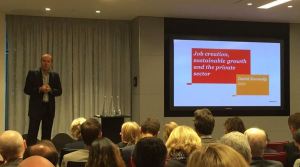
By Tina Chang and Sarah Montgomery
As another downpour drenches us in a very wet Washington, DC, it is very tempting to say that it is a damp start for the new World Bank strategy, launched this week at its 2013 annual meetings. But it’s been a very interesting few days for CAFOD’s economic justice team (both of us!) who are here to discuss ideas of how the Bank’s new, noble aspirations – of ending extreme poverty by 2030 and ensuring that the poorest get their fair share in prosperity gains – can be realised.
There are a lot of new and not so new buzz words flying around.
Poverty rates will not fall enough, we are told, unless there are top growth performances in developing countries and unless the poorest men and women benefit from those gains disproportionately – so the Bank needs to be “transformational”, take “smart risks” and promote “inclusive growth,” adopting the jobs mantra of the G20 governments. Just one disaster, we hear, can undo all progress, so we also need “resilience” and, of course, “sustainability”.
It is easy to be cynical about the World Bank. It is a large institution, contradictions are rife and change is difficult. As President Jim Yong Kim announces that one of the three pillars of the Bank’s climate agenda is sustainable energy for all (the other two are climate smart agriculture and low carbon more liveable cities), we learn that the Bank’s spending on fossil fuel projects, that have had at best mixed results for energy access for the poorest, rose again last year (Bit.ly/15udzv9). A major tool for the new inclusive growth agenda, is the old and highly-flawed Doing Business project.
But there are reasons to be optimistic this time around. Jim Kim has launched the first major reorganisation at the Bank for more than a decade, partly to promote the Bank as a facilitator to help countries learn from each others experience and to pull together evidence of what has worked. A big change for an institution often accused in the past of peddling ideologies and using its financial clout in developing countries to tell them what to do. One of Kim’s first actions as President was to launch an independent review of Doing Business, which has resulted in a radical agenda to overhaul this flagship project.
Of course, it is early days and CAFOD and civil society groups from around the world are here to try to ensure that the new impetus for change results in real improvements for poor men and women.
That’s why we gathered together experts from inside and outside the Bank to discuss how it can get better at “thinking small”.
Small and micro firms play a key role in economic development, inclusive growth and poverty alleviation (see our new Think Small report which will be online soon). Unless we include them as a target and support them as an important contributor to development we will continue to exclude the poorest from economic development and ‘shared prosperity’.
The Bank recognises the importance of small and micro enterprises (see their World Development Report 2013: Jobs) but does not have a coherent strategy for these key players in achieving its new corporate objectives. It does not even have a decent standard definition of what a small business is, it varies from study to project to department, with one working definition being a firm receiving a loan Dampof less than $15 million!
There is still much for the Bank, CAFOD and others to do. The process for reform of Doing Business is not yet mapped out and the discussion on a possible strategy on small businesses has only just started. Looks like there will be more trips to rainy Washington for us.
 he publication argues that the current economic framework is not working for women and has ‘shifted power relations in ways that undermine the enjoyment of human rights and the building of sustainable livelihoods’. Usefully, it goes on to provide some very concrete examples of what governments (and donors and even INGO’s) can do to tackle these challenges (for more on this see the infographic on pg 10 of the executive summary). (more…)
he publication argues that the current economic framework is not working for women and has ‘shifted power relations in ways that undermine the enjoyment of human rights and the building of sustainable livelihoods’. Usefully, it goes on to provide some very concrete examples of what governments (and donors and even INGO’s) can do to tackle these challenges (for more on this see the infographic on pg 10 of the executive summary). (more…)
 Today I’m posting my fourth and final blog in this inclusive growth mini-series (you can click here for the
Today I’m posting my fourth and final blog in this inclusive growth mini-series (you can click here for the  k
k

